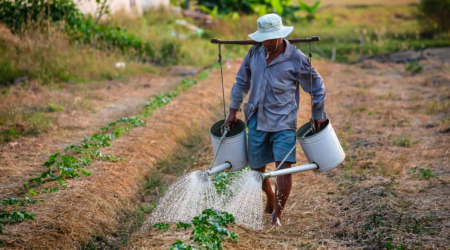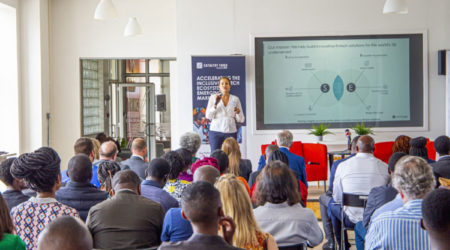Why we invested: Ziada is enabling informal workers, artisans and tradespeople to find work digitally

More than 90% of workers in developing countries rely on the informal economy to live. In Kenya, more specifically, eight out of ten workers are self-employed, with the vast majority running small, owner-operated, informal businesses. Recent research by the World Bank has shown that this population has disproportionately been – and is still being – affected by the COVID-19 crisis. Indeed, the crisis and the subsequent lockdowns and social distancing measures have significantly exacerbated an already existing problem for informal workers and more generally for artisans and tradespeople: limited, fragmented, and expensive access to markets or customers.
Simultaneously, the crisis has also transformed the way people access goods and services, growing digital consumption habits. In Kenya, research completed in late 2020 by the COVID-19 CEMEA Impact Tracker, shows that 39% of consumers surveyed made their first online grocery purchase because of the crisis, and this number has likely grown in the past year.
While retailers and restaurants have more successfully adapted to the shift to purchasing online, service people have yet to join the trend. Most still depend on individual contacts and word of mouth recommendations to secure work. To improve their access to work, and leverage the growing appetite for purchasing online, Ziada is building a platform that matches professional service providers with clients who need jobs done, while also offering them a growing suite of value-added services to improve their earning capabilities.
Impact
According to the Federation of Kenya Employers (FKE), an estimated 5.1 million people in Kenya working within the informal sector lost their jobs between March and August 2021, mainly due to the COVID crisis. Even those who maintained work faced drops and uncertainty in income.
This challenge adds to existing challenges already faced by artisans and tradespeople (called “service providers” thereafter) in Kenya and across Africa, the most pressing of which is that they are by-and-large unable to increase their day-to-day profitability and take-home income. This is due to several barriers:
- Access to clients: Service providers lack information on where prospective clients are located and what jobs these potential clients are seeking. This gap in knowledge means they are not able to efficiently look for and acquire potential clients. As a result, service providers spend a lot of time and money just looking for prospective clients.
- Access to equipment: When service providers (carpenters or car mechanics, for instance) identify prospective clients, they are often met with another challenge: the cost (or unfavorable acquisition terms, as highlighted recently in recent research by CGAP) of acquiring the required tools to complete the requested job (e.g., raw material, mechanical tools) is high . As a result, a number of service providers have to turn down potential jobs for clients due to this financing gap.
- Access to growth opportunities: After overcoming the first two challenges, a third one often grows with time for a number of service providers: making their work sustainable and growth-oriented. Due to poor access to education and relevant information, service providers struggle to hire/supervise employees, manage their costs, or market themselves in a powerful way. Consequently, growing their informal businesses and potentially formalising their work becomes extremely difficult.
Ziada’s team has thoroughly researched these challenges and developed an app to respond to the first problem on this list, while working on solutions to tackle the other two in the second phase. The significant uptake of their native mobile app (over 40,000 downloads since launch about a year ago under the name of Kazi) illustrates their insights were correct, and the solution is meeting some demand in the market. While the current platform addresses the first of this set of three complex challenges, Ziada is already piloting solutions to bring a more comprehensive answer to the entire set of barriers. This includes an offering to solve the challenge around accessing financing for necessary equipment and additional financial services in the works to continue to meet the needs of these informal workers.
Innovation
Matching service providers with clients using a digital platform is not a new idea. There are already similar models scaling in various geographies, including the U.S. (TaskRabbit – acquired by Ikea, Thumbtack), Europe (Stootie, Bizzby), South Asia (Lookup), South Africa (Kandua) or Latin America (Fix). The uniqueness of each local or regional solution comes from the level of customization and localization of the platform design.
In the specific case of Ziada, the willingness from day one to build something more comprehensive than a matching platform, coupled with the founders’ deep understanding from the local founders of the specific segment they are operating in, is what makes the offering unique. For example, Ziada has always ensured its mobile app remains as data efficient as possible while also leveraging “offline” tools (SMS, for instance) to automate its interactions with service providers for whom the cost of data can be high.
Traction over the past year has given Ziada numerous opportunities to start charging for their service, but learning from the experiences of the likes of Thumbtack, the team decided to keep the platform free initially while now deploying a monetization approach customized to the specific regional and local context. This is the approach the team has taken for the matching solution, but also for new features Ziada has been piloting and will be launching over the coming months.
Growth Potential
There are over 15 million informal workers in Kenya, and this segment is growing over 5% each year. Looking more regionally at the continent level, over 90% of the working population is in the informal sector.
Meanwhile, fast-growing smartphone adoption in the region (already at over 50% of all mobile connections in sub-Saharan Africa, according to GSMA, and expected to reach 65% in the next five years) is accelerating consumer shifts towards digital services.
Driving on 30%+ quarterly growth, Ziada is already and will increasingly be at the crossroads of these two powerful trends.
The Catalyst Fund model delivers outsized success compared with other accelerator programs. We accelerate startups that excel on three fronts:
- Impact: Catalyst Fund startups deliver (or, in the case of B2B firms, facilitate the delivery) of life-changing products and services to underserved populations. These can include financial services like loans, savings, insurance, and investment, but also access to productive inputs or essential services such as energy, sanitation, and water.
- Innovation: Our startups are pioneering game-changers that are innovating new products and business models. They drive the sector forward by demonstration effect and via the learning that Catalyst Fund documents and shares.
- Growth potential: Catalyst Fund startups are distinctively investment worthy, developing businesses that are scalable, with high growth potential. Our startups are selected by an Investor Advisory Committee, who have deep experience in emerging markets and nominate high-potential startups, and then sponsor and mentor them through Catalyst Fund. As a result, our startups raise more funding than startups from other accelerators.


